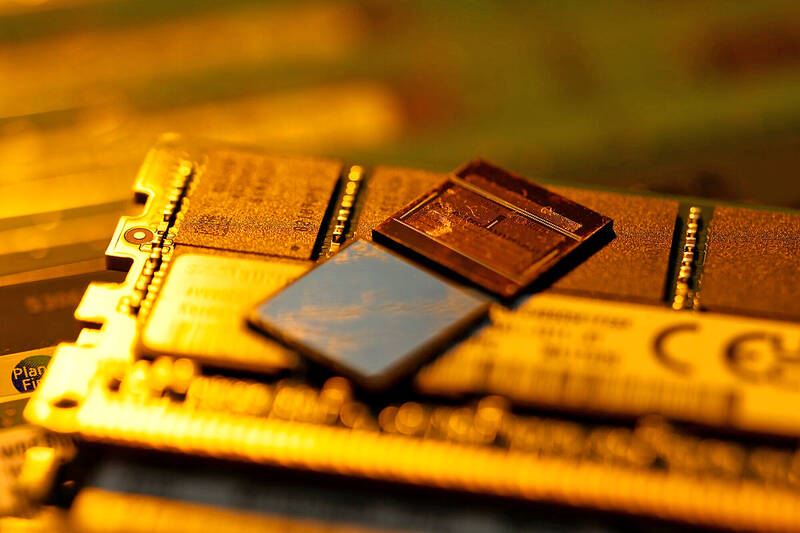Samsung Electronics Co is replacing the head of its semiconductor arm, appointing a longtime memorychip veteran to spearhead efforts to catch up with SK Hynix Inc in the booming artificial intelligence (AI) arena.
Samsung named Jun Young-hyun the new leader of its most important business line. He replaces Kyung Kye-hyun, who is to head up Samsung’s Advanced Institute of Technology and the future business team.
Jun, 63, joined the division in 2000 and helped the company develop its basic DRAM and flash memory chips for smartphones and servers.

Photo: Bloomberg
The appointment comes after Kyung offered to step down from his post, a person familiar with the matter said.
Samsung has fallen behind SK Hynix in high-bandwidth memory (HBM) chips, which have seen explosive growth because they are used for training AI models such as ChatGPT.
“It’s unusual for Samsung to do this management change in the middle of the year,” CLSA Securities Korea Ltd analyst Sanjeev Rana said. “This highlights Samsung’s desperate attempt to inject new energy and fresh thinking into its semiconductor business, where its lead has been slipping away.”
In addition, Jun’s appointment comes at an age when most Samsung executives retire, Rana said.
“His expertise was deemed necessary to help Samsung navigate the current challenging situation,” he said.
SK Hynix is the biggest supplier of memory used to develop ChatGPT-like services around the world. Its production capacity for such chips is almost fully booked through next year.
The firm plans to spend about US$14.6 billion building a new complex in South Korea to meet demand for HBM chips, which work alongside Nvidia Corp accelerators in creating and hosting AI platforms. It is also building a US$4 billion packaging facility in Indiana — its first in the US.
Samsung, which also makes logic chips and operates a foundry business, has also embarked on a global expansion that encompasses a US$40 billion investment in US chipmaking.
In the foundry business, Samsung has struggled to win big customers and narrow Taiwan Semiconductor Manufacturing Co’s (台積電) overwhelming lead in producing advanced chips.
Samsung has begun mass production of its latest HBM product, eight-layer HBM3E, and says it plans to mass produce 12-layer HBM chips in the second quarter of this year.
The company expects its supply of HBM to increase by at least three times this year compared with last year.

WEAKER ACTIVITY: The sharpest deterioration was seen in the electronics and optical components sector, with the production index falling 13.2 points to 44.5 Taiwan’s manufacturing sector last month contracted for a second consecutive month, with the purchasing managers’ index (PMI) slipping to 48, reflecting ongoing caution over trade uncertainties, the Chung-Hua Institution for Economic Research (CIER, 中華經濟研究院) said yesterday. The decline reflects growing caution among companies amid uncertainty surrounding US tariffs, semiconductor duties and automotive import levies, and it is also likely linked to fading front-loading activity, CIER president Lien Hsien-ming (連賢明) said. “Some clients have started shifting orders to Southeast Asian countries where tariff regimes are already clear,” Lien told a news conference. Firms across the supply chain are also lowering stock levels to mitigate

Six Taiwanese companies, including contract chipmaker Taiwan Semiconductor Manufacturing Co (TSMC, 台積電), made the 2025 Fortune Global 500 list of the world’s largest firms by revenue. In a report published by New York-based Fortune magazine on Tuesday, Hon Hai Precision Industry Co (鴻海精密), also known as Foxconn Technology Group (富士康科技集團), ranked highest among Taiwanese firms, placing 28th with revenue of US$213.69 billion. Up 60 spots from last year, TSMC rose to No. 126 with US$90.16 billion in revenue, followed by Quanta Computer Inc (廣達) at 348th, Pegatron Corp (和碩) at 461st, CPC Corp, Taiwan (台灣中油) at 494th and Wistron Corp (緯創) at

NEGOTIATIONS: Semiconductors play an outsized role in Taiwan’s industrial and economic development and are a major driver of the Taiwan-US trade imbalance With US President Donald Trump threatening to impose tariffs on semiconductors, Taiwan is expected to face a significant challenge, as information and communications technology (ICT) products account for more than 70 percent of its exports to the US, Chung-Hua Institution for Economic Research (CIER, 中華經濟研究院) president Lien Hsien-ming (連賢明) said on Friday. Compared with other countries, semiconductors play a disproportionately large role in Taiwan’s industrial and economic development, Lien said. As the sixth-largest contributor to the US trade deficit, Taiwan recorded a US$73.9 billion trade surplus with the US last year — up from US$47.8 billion in 2023 — driven by strong

ASE Technology Holding Co (ASE, 日月光投控), the world’s biggest chip assembly and testing service provider, yesterday said it would boost equipment capital expenditure by up to 16 percent for this year to cope with strong customer demand for artificial intelligence (AI) applications. Aside from AI, a growing demand for semiconductors used in the automotive and industrial sectors is to drive ASE’s capacity next year, the Kaohsiung-based company said. “We do see the disparity between AI and other general sectors, and that pretty much aligns the scenario in the first half of this year,” ASE chief operating officer Tien Wu (吳田玉) told an